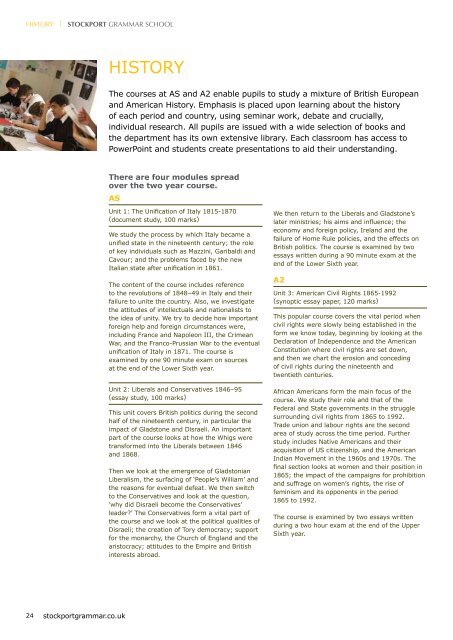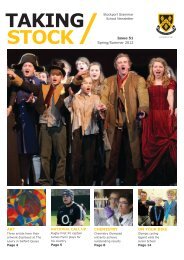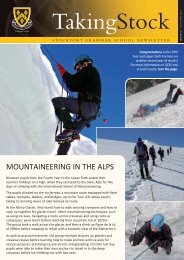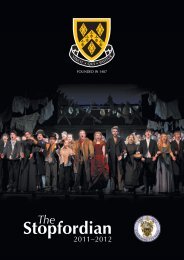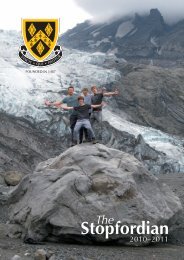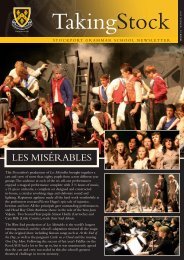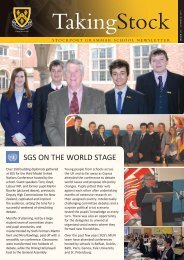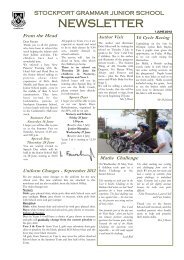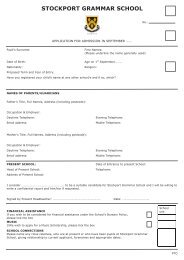Download the prospectus (pdf) - Stockport Grammar School
Download the prospectus (pdf) - Stockport Grammar School
Download the prospectus (pdf) - Stockport Grammar School
Create successful ePaper yourself
Turn your PDF publications into a flip-book with our unique Google optimized e-Paper software.
HISTORY | STOCKPORT GRAMMAR SCHOOL<br />
STOCKPORT GRAMMAR SCHOOL | HISTORY<br />
HISTORY<br />
The courses at AS and A2 enable pupils to study a mixture of British European<br />
and American History. Emphasis is placed upon learning about <strong>the</strong> history<br />
of each period and country, using seminar work, debate and crucially,<br />
individual research. All pupils are issued with a wide selection of books and<br />
<strong>the</strong> department has its own extensive library. Each classroom has access to<br />
PowerPoint and students create presentations to aid <strong>the</strong>ir understanding.<br />
There are four modules spread<br />
over <strong>the</strong> two year course.<br />
AS<br />
Unit 1: The Unification of Italy 1815-1870<br />
(document study, 100 marks)<br />
We study <strong>the</strong> process by which Italy became a<br />
unified state in <strong>the</strong> nineteenth century; <strong>the</strong> role<br />
of key individuals such as Mazzini, Garibaldi and<br />
Cavour; and <strong>the</strong> problems faced by <strong>the</strong> new<br />
Italian state after unification in 1861.<br />
The content of <strong>the</strong> course includes reference<br />
to <strong>the</strong> revolutions of 1848–49 in Italy and <strong>the</strong>ir<br />
failure to unite <strong>the</strong> country. Also, we investigate<br />
<strong>the</strong> attitudes of intellectuals and nationalists to<br />
<strong>the</strong> idea of unity. We try to decide how important<br />
foreign help and foreign circumstances were,<br />
including France and Napoleon III, <strong>the</strong> Crimean<br />
War, and <strong>the</strong> Franco-Prussian War to <strong>the</strong> eventual<br />
unification of Italy in 1871. The course is<br />
examined by one 90 minute exam on sources<br />
at <strong>the</strong> end of <strong>the</strong> Lower Sixth year.<br />
We <strong>the</strong>n return to <strong>the</strong> Liberals and Gladstone’s<br />
later ministries; his aims and influence; <strong>the</strong><br />
economy and foreign policy, Ireland and <strong>the</strong><br />
failure of Home Rule policies, and <strong>the</strong> effects on<br />
British politics. The course is examined by two<br />
essays written during a 90 minute exam at <strong>the</strong><br />
end of <strong>the</strong> Lower Sixth year.<br />
A2<br />
Unit 3: American Civil Rights 1865-1992<br />
(synoptic essay paper, 120 marks)<br />
This popular course covers <strong>the</strong> vital period when<br />
civil rights were slowly being established in <strong>the</strong><br />
form we know today, beginning by looking at <strong>the</strong><br />
Declaration of Independence and <strong>the</strong> American<br />
Constitution where civil rights are set down,<br />
and <strong>the</strong>n we chart <strong>the</strong> erosion and conceding<br />
of civil rights during <strong>the</strong> nineteenth and<br />
twentieth centuries.<br />
Unit 4: Russian Revolutions 1894-1924<br />
(coursework essays, 80 marks)<br />
This module is concerned with interpreting <strong>the</strong><br />
reasons for <strong>the</strong> revolutions in Russia in 1905<br />
and 1917 and <strong>the</strong> outcome of <strong>the</strong> establishment<br />
of a Communist government. The revolution in<br />
1905 and why <strong>the</strong> Tsar survived is <strong>the</strong> starting<br />
focus. Why Lenin and <strong>the</strong> Bolsheviks were able to<br />
maintain <strong>the</strong>mselves in power up to 1924 covers<br />
<strong>the</strong> consolidation period. Then finally we look at<br />
<strong>the</strong> extent to which Lenin was merely a dictator<br />
who took and held power by force. We also spend<br />
time examining <strong>the</strong> role of individuals such as<br />
Trotsky and use new sources of information.<br />
The course is examined by three coursework<br />
essays completed over <strong>the</strong> year. Two essays are<br />
based upon sources provided by <strong>the</strong> examination<br />
board and <strong>the</strong> second essay will be based upon<br />
a set topic requiring individual research and<br />
decision making.<br />
All Sixth Form historians have <strong>the</strong> opportunity to<br />
attend conferences and talks organised by <strong>the</strong><br />
department. Members of <strong>the</strong> Lower Sixth have<br />
recently travelled on our trips to <strong>the</strong> United States<br />
and to Berlin and Prague. All Lower Sixth pupils<br />
have <strong>the</strong> option of taking part in our annual visit<br />
to London Museums each June.<br />
History is a very popular option at A Level. The<br />
study of History provides students with many<br />
essential skills which will help at degree level,<br />
but also with careers. Many historians indeed go<br />
on to fur<strong>the</strong>r study of History at university, but<br />
historians also go onto study law, accountancy,<br />
journalism and medicine, to name but a few<br />
recent examples. The study of History provides<br />
students with skills such as those of research,<br />
analysis, independent learning, argument and<br />
sifting of information.<br />
Unit 2: Liberals and Conservatives 1846–95<br />
(essay study, 100 marks)<br />
This unit covers British politics during <strong>the</strong> second<br />
half of <strong>the</strong> nineteenth century, in particular <strong>the</strong><br />
impact of Gladstone and Disraeli. An important<br />
part of <strong>the</strong> course looks at how <strong>the</strong> Whigs were<br />
transformed into <strong>the</strong> Liberals between 1846<br />
and 1868.<br />
Then we look at <strong>the</strong> emergence of Gladstonian<br />
Liberalism, <strong>the</strong> surfacing of ‘People’s William’ and<br />
<strong>the</strong> reasons for eventual defeat. We <strong>the</strong>n switch<br />
to <strong>the</strong> Conservatives and look at <strong>the</strong> question,<br />
‘why did Disraeli become <strong>the</strong> Conservatives’<br />
leader?’ The Conservatives form a vital part of<br />
<strong>the</strong> course and we look at <strong>the</strong> political qualities of<br />
Disraeli; <strong>the</strong> creation of Tory democracy; support<br />
for <strong>the</strong> monarchy, <strong>the</strong> Church of England and <strong>the</strong><br />
aristocracy; attitudes to <strong>the</strong> Empire and British<br />
interests abroad.<br />
African Americans form <strong>the</strong> main focus of <strong>the</strong><br />
course. We study <strong>the</strong>ir role and that of <strong>the</strong><br />
Federal and State governments in <strong>the</strong> struggle<br />
surrounding civil rights from 1865 to 1992.<br />
Trade union and labour rights are <strong>the</strong> second<br />
area of study across <strong>the</strong> time period. Fur<strong>the</strong>r<br />
study includes Native Americans and <strong>the</strong>ir<br />
acquisition of US citizenship, and <strong>the</strong> American<br />
Indian Movement in <strong>the</strong> 1960s and 1970s. The<br />
final section looks at women and <strong>the</strong>ir position in<br />
1865; <strong>the</strong> impact of <strong>the</strong> campaigns for prohibition<br />
and suffrage on women’s rights, <strong>the</strong> rise of<br />
feminism and its opponents in <strong>the</strong> period<br />
1865 to 1992.<br />
The course is examined by two essays written<br />
during a two hour exam at <strong>the</strong> end of <strong>the</strong> Upper<br />
Sixth year.<br />
24 stockportgrammar.co.uk stockportgrammar.co.uk 25


